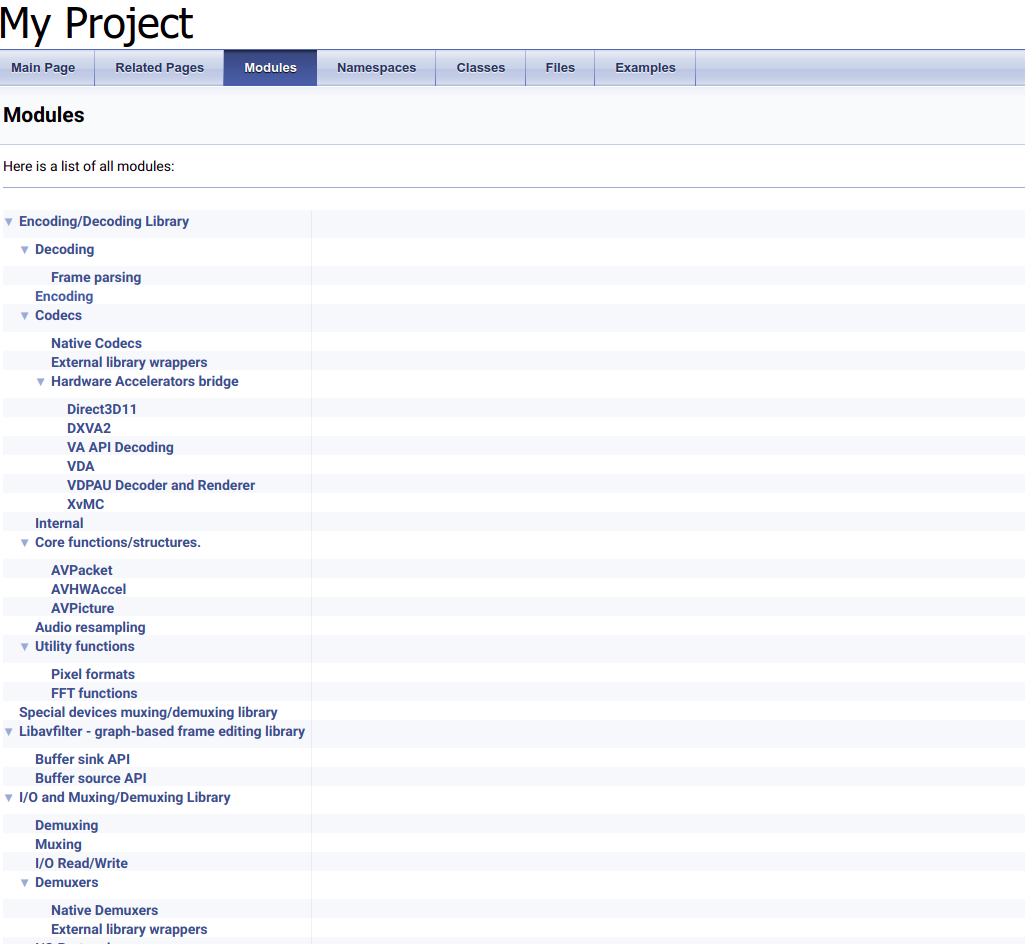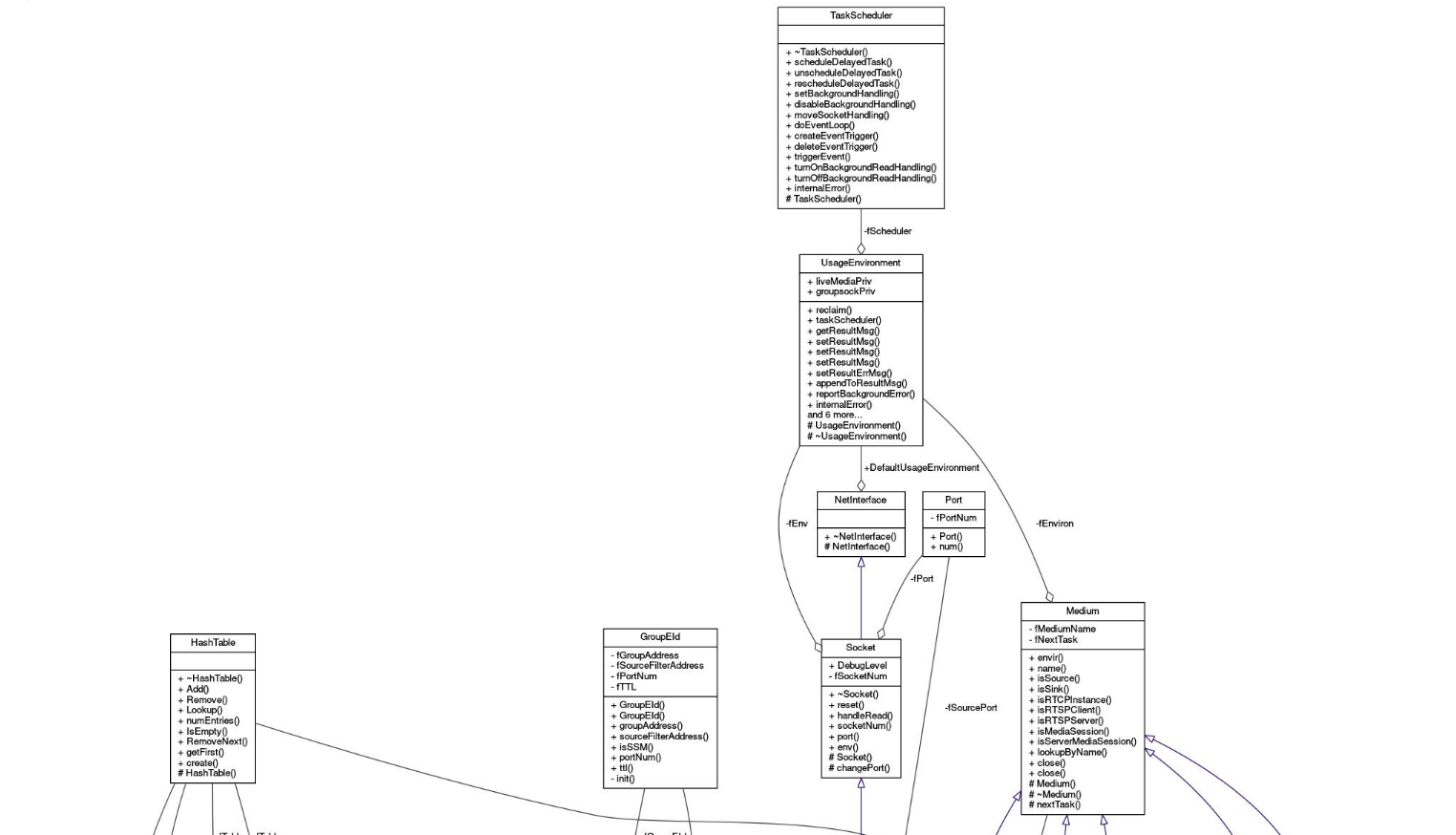Doxygen code document generation tool
Doxygen
According to Baidu Encyclopedia, Doxygen is an open source, cross platform document system that supports C, C + +, Java and Objective-C languages. It can generate online HTML reference manuals or offline Latex and RTF reference manuals
Doxygen is a program file generation tool, which can convert specific comments in the program into instruction files.
-
For non archived source files, you can extract the code structure by configuring Doxygen
-
Dependency graphs can be generated
-
Can generate inheritance diagram, collaboration diagram, etc
Doxygen comments
The code annotation rules are as follows
External interface of the module, only in.h Note information is provided in Auxiliary functions inside the module, or private functions, are only available in the.c Retain comment information in
Function comments are generally
- Function function
- Entry parameters
- Return value
- matters needing attention
- context
How does Doxygen distinguish between ordinary annotations and output annotations
For C, there are generally two kinds of C + + annotations
//
/**/
Doxygen by adding *, /,! As a special mark
/* * Normal comment */
Doxygen sets * or * after commenting the first *! As a sign, if these are detected,
The following comments will be interpreted as export documents
At the same time, the middle * sign can be omitted, like this
/** Comments to be output as documents */ perhaps /*! Comments to be output as documents */
How Doxygen extracts information from special annotations
Doxygen uses \ and @ as special markers. When a special marker is detected in the special annotation, it will then detect whether the following word is specified in advance by Doxygen. If so, the following annotation will be interpreted according to specific rules; If not, interpret \ and @ as plain text,
Is it stipulated in advance that you can view the documents on Doxygen's official website
vscode plugin
Doxygen Documentation Generator
In vscode, you can use plug-ins to quickly generate doxygen annotations
User setting in vscode The JSON plug-in is set as follows
{
"window.zoomLevel": 0,
"editor.minimap.enabled": false,
"python.pythonPath": "C:\\Users\\jordan\\AppData\\Local\\Programs\\Python\\Python37\\python.exe",
"workbench.iconTheme": "vscode-icons",
"explorer.autoReveal": false, //Cancel left auto focus
"terminal.integrated.shell.windows": "D:\\Program Files\\Git\\bin\\bash.exe",
"terminal.external.windowsExec": "D:\\Program Files\\Git\\bin\\bash.exe",
"todo-tree.highlights.enabled": true,
// Doxygen documentation generator set
"doxdocgen.file.copyrightTag": [
"@copyright Copyright (c) {year} XX Communication company"
],
"doxdocgen.file.customTag": [
"@par Modify log:",
"<table>",
"<tr><th>Date <th>Version <th>Author <th>Description",
"<tr><td>{date} <td>1.0 <td>wangh <td>content",
"</table>",
],
"doxdocgen.file.fileOrder": [
"file",
"brief",
"author",
"version",
"date",
"empty",
"copyright",
"empty",
"custom"
],
"doxdocgen.file.fileTemplate": "@file {name}",
"doxdocgen.file.versionTag": "@version 1.0",
"doxdocgen.generic.authorEmail": "wanghuan3037@fiberhome.com",
"doxdocgen.generic.authorName": "wangh",
"doxdocgen.generic.authorTag": "@author {author} ({email})",
"doxdocgen.generic.order": [
"brief",
"tparam",
"param",
"return"
],
"doxdocgen.generic.paramTemplate": "@param{indent:8}{param}{indent:25}My Param doc",
"doxdocgen.generic.returnTemplate": "@return {type} ",
"doxdocgen.generic.splitCasingSmartText": true,
}
{
// Doxygen documentation generator set
// File notes: copyright information template
"doxdocgen.file.copyrightTag": [
"@copyright Copyright (c) {year} XX Communication company"
],
// File Comment: custom module. Here I add a modification log
"doxdocgen.file.customTag": [
"@par Modify log:",
"<table>",
"<tr><th>Date <th>Version <th>Author <th>Description",
"<tr><td>{date} <td>1.0 <td>wangh <td>content",
"</table>",
],
// Composition and sorting of file notes
"doxdocgen.file.fileOrder": [
"file", // @file
"brief", // @brief introduction
"author", // author
"version", // edition
"date", // date
"empty", // Empty line
"copyright",// copyright
"empty",
"custom" // custom
],
// Next, set the specific information of the above tag tag
"doxdocgen.file.fileTemplate": "@file {name}",
"doxdocgen.file.versionTag": "@version 1.0",
"doxdocgen.generic.authorEmail": "wanghuan3037@fiberhome.com",
"doxdocgen.generic.authorName": "wangh",
"doxdocgen.generic.authorTag": "@author {author} ({email})",
// Date format and template
"doxdocgen.generic.dateFormat": "YYYY-MM-DD",
"doxdocgen.generic.dateTemplate": "@date {date}",
// According to the automatically generated annotation template (mainly reflected in function annotation at present)
"doxdocgen.generic.order": [
"brief",
"tparam",
"param",
"return"
],
"doxdocgen.generic.paramTemplate": "@param{indent:8}{param}{indent:25}My Param doc",
"doxdocgen.generic.returnTemplate": "@return {type} ",
"doxdocgen.generic.splitCasingSmartText": true,
}
Enter / * * in front of the function and press enter
/**
* @brief
* @param data My Param doc
* @param left_1 My Param doc
* @param right_1 My Param doc
* @param left_2 My Param doc
* @param right_2 My Param doc
*/
void merge(vector<int>& data, int left_1, int right_1, int left_2,
int right_2)
You can then use Doxygen to generate documents
Doxygen actual use
I am used to using Doxygen's visualization tools. The specific tutorials are

The class diagram is as follows
